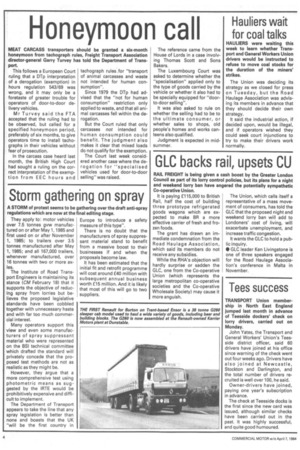Honeymoon call
Page 6

If you've noticed an error in this article please click here to report it so we can fix it.
MEAT CARCASS transporters should be granted a six-month honeymoon from tachograph rules, Freight Transport Association director-general Garry Turvey has told the Department of Transport.
This follows a European Court ruling that a DTp interpretation of a derogation (exemption) in hours regulation 543/69 was wrong, and it may only be a foretaste of greater trouble for operators of door-to-door delivery vehicles.
Mr Turvey said the FTA accepted that the ruling had to be observed, but called for a specified honeymoon period, preferably of six months, to give operators time to install tachographs in their vehicles without fear of prosecution.
In the carcass case heard last month, the British High Court had sought a ruling on the correct interpretation of the exemption from EEC hours and tachograph rules.for "transport of animal carcasses and waste not intended for human consumption".
Since 1979 the DTp had advised that the "not for human consumption" restriction only applied to waste, and that all animal carcasses fell within the derogation.
But the Court ruled that only carcasses not intended for human consumption could benefit. The judgment also makes it clear that mixed loads do not qualify for the exemption.
The Court last week considered another case where the derogation for "specialised vehicles used for door-to-door selling" was raised. The reference came from the House of Lords in a case involving Thomas Scott and Sons Bakers.
The Luxembourg Court was asked to determine whether the "specialisation" applied only to the type of goods carried by the vehicle or whether it also had to be specially equipped for "doorto-door selling".
It was also asked to rule on whether the selling had to be to the ultimate consumer, or whether sales to shops, old people's homes and works canteens also qualified.
Judgment is expected in midsummer.




































































































